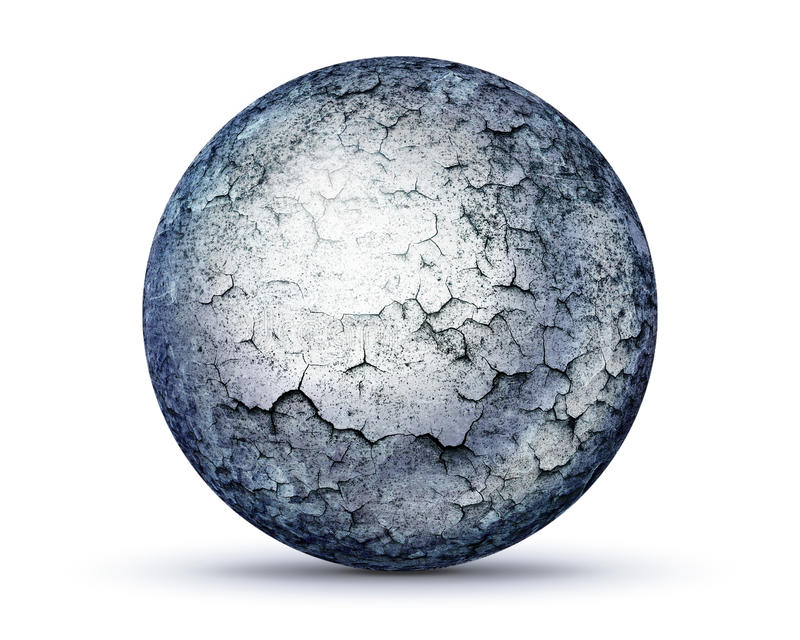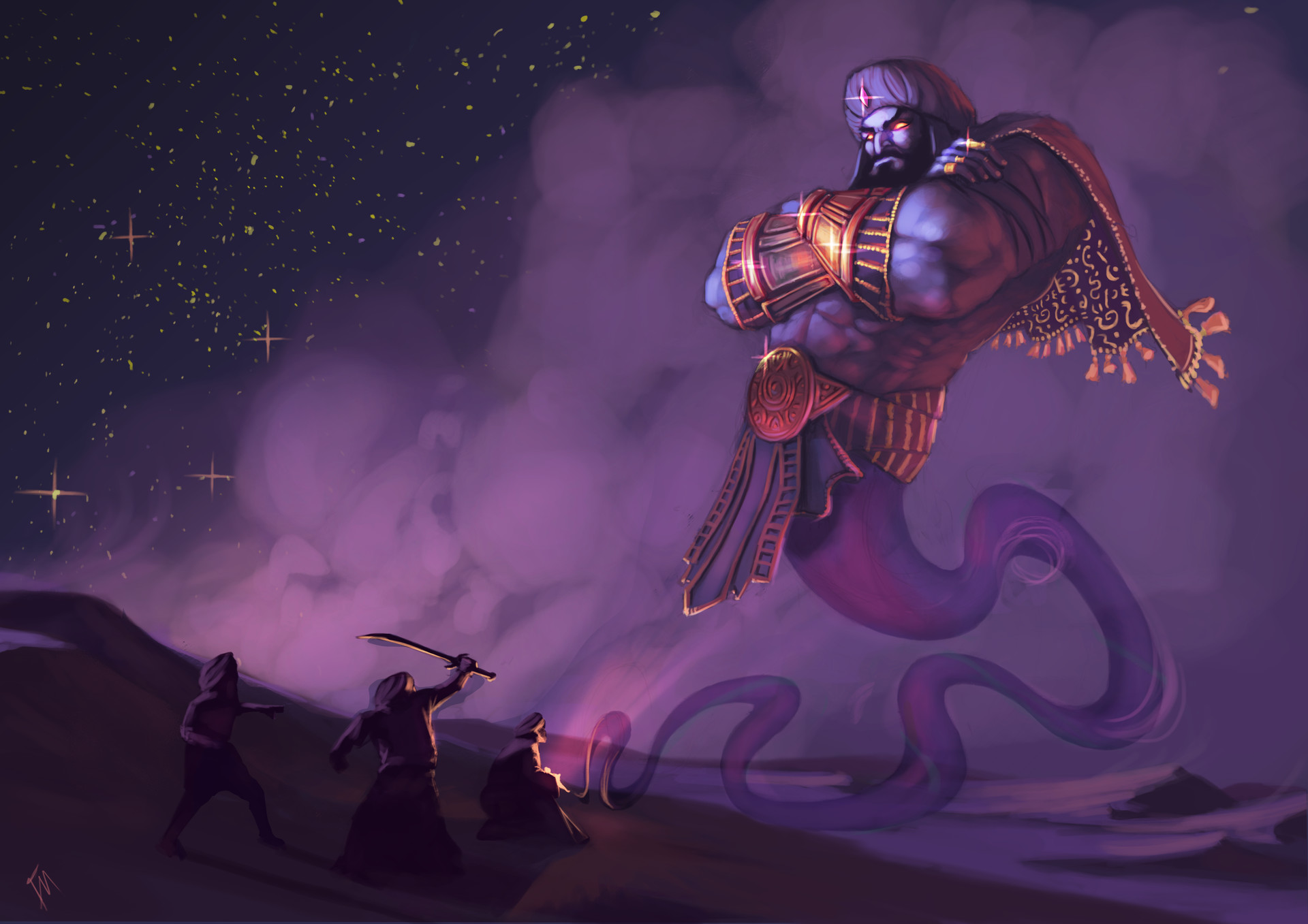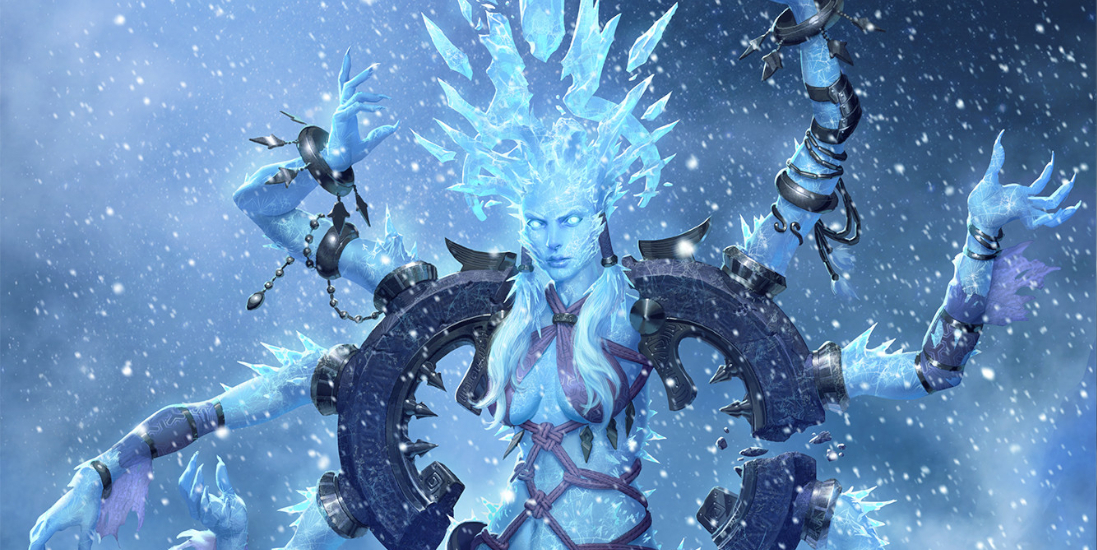Djinn
A wish? You think you are entitled to one, planeswalker, simply for finding me here? You're not even trying to negotiate! But yes yes, I see you will not be deterred. I suppose this is what I get for calling myself benevolent. Here... Before you state your wish, let me show you my collection...Djinns are powerful eternals born from the fusion of Magic and Matter. They come from the deepest reaches of the Elemental Planes, being imbued at birth with a specific element, giving rise to five distinct subspecies. A djinn's innate capability for sorcery is great, and their magical talents only grow as they advance in age. Djinns are among the rarest and most powerful creatures in the Universe. From the moment of their birth they possess such amazingly powerful arcane talent that their magics transcend the limitations of mortal spellcraft. Their magics rarely rival that of the gods, but ancient djinns can compete with the most powerful of demigods and even planetars. It cannot be overstated how dangerous an opponent a djinn can be to mere mortal adventurers, who -- truth be told -- should stand little to no chance against even the youngest djinns. Contents
Subspecies
Efreeti
Efreetis are fire djinns, as wild and chaotic by nature as the element they are born of. Their home is the realm of Muspelheim.Shiva
Shivas are djinns imbued with the element of frost, born in the depths of Niflheim. Their personalities typically resemble those of frost giants, being irreconcilable, merciless, and unforgiving.Dao
Daos are djinns of the earth. Stoic, stubborn, and resolute by nature, they tend to seclude themselves in Vanaheim, the plane of earth.Marid
Marids are djinns born from the elemental energy of water in Gandvikheim. They are adaptable creatures, quick to anger and quick to calm, and are perhaps the most easily approachable djinns by mortal standards.Yanni
Yannis are djinns of the element of air. They are born in Vanaheim, the plane of air. Their moods and motives are ephemeral, flowing this way and that like the wind, giving rise to temperaments that are somewhat even on average -- but very much unpredictable.Social structure
Djinns are supremacist creatures that treat each other -- and other powerful planar creatures -- in a very savage manner. They adhere to a crude hierarchy based on strength, and each djinn holds its own territory that it guards jealously and violently, whether that territory be somewhere on Amanor or in the elemental planes. Despite the fact that, as eternals, djinns do not reproduce, their motivations are rather animalistic; each djinn seeks to grow in power and ensure their own survival, eliminating any competition and would-be competition. Indeed, powerful djinns mercilessly slay lesser djinns before they can become too powerful.Civilization and culture
Djinns are extremely intelligent and -- at times -- even sophisticated creatures, but their animalistic relationships with one another prevent them from forming unified organizations. Their supremacist and aggressive natures are apparent in their interactions with other creatures, even in diplomacy, bartering, and simple social dialog. Most djinns are self-serving, proud, and cold-hearted, having little to no empathy for the lives and fates of other creatures. As eternals that are isolatory by nature, djinns rarely value social bonds and lasting relationships. The appearance and behaviour of djinns is influenced by their exposure to other creatures. Isolatory djinns that only interact with elementals are barbaric and unrefined, manifesting avatars of pure matter and likely attacking adventurers on sight. Djinns that dwell near civilization might have taken a liking to mortal pleasures and pastimes, living in lavish palaces surrounded by magical servants, appearing as beautiful humanoids dressed in extravagant clothing and taking on arbitrary mortal titles such as "king" or "sultan".Dealings with mortals
Djinns rarely have dealings with the mortals of Amanor. Djinns are somewhat more common in the hybridized zones of the Elemental Planes where planar creatures such as giants and genasi have established their settlements, but most djinns reside in seclusion within the deepest reaches of the Elemental Planes where they cannot be easily followed. Unlike what folk tales and legends would have you believe, djinns are very difficult to persuade. Kind-hearted djinns are few and far between. Bartering is likely the best course, but there are very few commodities that are valuable to a creature that can use arcane magic to perform miraculous effects at will. Threats of imprisonment or violence do not concern most djinns, and, in fact, neither do actual imprisonment or violence. The passage of time is often meaningless to a djinn -- at least within the scope of mortal machinations. Their vast magical talents enable them to efficiently guard their hearts and thus their very lives from most dangers, and thus djinns rarely have reason to be concerned with their physical well-being.Naming traditions
As djinns are born from the spontaneous interaction of magic and matter, they do not have biological families. Djinns most often choose names for themselves but these names can seem strange to mortals, for djinns spend great lengths of time in isolation in the elemental planes, interacting mostly with no other creatures besides the wildest of elementals. Sufficiently isolatory and savage djinns might not even have a need for a name, but might be given names by other creatures. To further muddle the naming conventions of djinns -- if there even are any such conventions -- djinns have no language of their own. They often learn the language of the elementals they encounter, and might use that language to name themselves. How this name translates to other languages can vary. Interestingly, djinns do not exactly have a need to learn languages in a conventional manner, for they can simply use arcane spellcraft to understand any and all writing and speech -- similarly to how mortal spellcasters have created the spell Comprehend Languages, which of course is a rudimentary incantation by djinn standards. Simply put, djinns that often deal with other creatures can have names that are easy for mortals to pronounce and use, but isolatory djinns that dwell deep within the Elemental Planes might have names that are exotic, unwieldy, and incomprehensible.Navigate in Eternals
SYNONYMS
djinni, genie PHYSICAL INFORMATION
Bodies of djinns are comprised only of a small orb of the purest matter: the so-called djinn's heart. Any other physical manifestation is entirely the djinn's own fabrication, whether it be humanoid, bestial, or elemental. Djinns produce these avatars through magical means, for example with conjuration or illusion. LIFE-CYCLE
Reproduction and birth
As eternals djinns are not born biologically.
Growth rate and stages
Unknown.
Mortality and death
When suffering a violent death, djinns leave behind the corporeal remains of their heart. ECOLOGY
Origin or ancestry
Creation of the universe.
Distribution
Entire cosmos, but very rarely encountered outside Elemental Planes.
Habitats
Elemental planes, primarily. Djinns very rarely make lairs on Amanor.
Population
Unknown.
djinni, genie PHYSICAL INFORMATION
Bodies of djinns are comprised only of a small orb of the purest matter: the so-called djinn's heart. Any other physical manifestation is entirely the djinn's own fabrication, whether it be humanoid, bestial, or elemental. Djinns produce these avatars through magical means, for example with conjuration or illusion. LIFE-CYCLE
Reproduction and birth
As eternals djinns are not born biologically.
Growth rate and stages
Unknown.
Mortality and death
When suffering a violent death, djinns leave behind the corporeal remains of their heart. ECOLOGY
Origin or ancestry
Creation of the universe.
Distribution
Entire cosmos, but very rarely encountered outside Elemental Planes.
Habitats
Elemental planes, primarily. Djinns very rarely make lairs on Amanor.
Population
Unknown.
Djinn's heart
Every djinn is magically bound to a small mote of the purest elemental matter. This mote is, in practice, their true physical form, and it is known as the djinn's heart. It is always composed of the djinn's own innate element: fire, frost, earth, water, or air.Below: The heart of a dao is a mote of pure earth.

by Geforzo







Comments